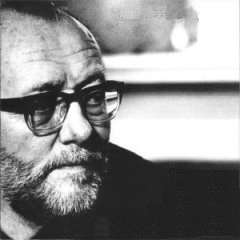April is National Poetry Month, and so it is a good excuse to read and translate some favorite poets. Günter Eich (1907-1972) has always been been one of my favorite poets of the immediate postwar period. His sober look at the grim reality of Germany and his own life helped to revive German as a language for lyric poetry. In Pfannkuchenrezept he incorporates a collage of American brand names and places into a juxtaposition of idyllic childhood memories with the deprivations of the present. Eich spent several months in an American POW camp in 1946.
Pfannkuchenrezept
Die Trockenmilch der Firma
Harrison Brothers,
Chikago,
das Eipulver von Walkers, Merrymaker & Co,
Kingstown, Alabama,
das von der deutschen Campfùhrung nicht
unterschlagene Mehl
und die Zuckerration von drei Tagen
ergeben, gernischt mit dem gut gechlorten Wasser des
Altvaters Rhein,
einen schònen Pfannkuchenteig.
Man brate ihn in der Schmalzportion fùr acht Mannauf dem Deckel einer Konservenbùchse
und über
dem Feuer
von lange gedörrtem Gras.
Wenn ihr ihn dann gerneinsam verzehrt,
jeder sein Achtel,
oh dann spürt ihr, wenn er auf die Zunge zergeht,in einer
üppigen Sekunde das Glück der geborgenen
Kindheit,
wo ihr in die Küche euch schlichet, ein Stück Teig zu erbetteln in
der Vorweihnachtszeit,oder ein Stück Waffel,
weil Besuch gekomrnen war am
Sonntagnachmittag,
spürt ihr in der schnell vergangenen Sekunde allenKuchenduft der’ Kinderjahre,
habt noch einmalfest gepackt den Schürzenzipfel
der Mutter,
oh Ofenwärme, Mutterwärme, – bis ihr
wieder erwacht und die Hände leer sind
und ihr euch hungrig anseht und wieder
mürrisch zurückgeht ins Erdloch. Der Kuchenwar auch nicht richtig
geteilt gewesen und immermuß
man aufpassen, daß man nicht zu kurz kommt.(Pancake Recipe
The powdered milk of the Harrison Brothers Company, Chicago,
the egg powder from Walkers, Merry Maker & Co, Kingstown, Alabama,
the flour that the German camp bosses did not misappropriate
and the three day ration of sugar mixed in with the chlorinated water of the Old Father Rhine,
makes for a nice batter.
You fry it up in eight men's ration of fat
on the lid of a tin can and on the fire
of long parched grass.
Then when you eat it together,
each gets his one-eigth portion,
oh then you can feel it melt on the tongue,
in a lush second the joy of childhood returns,
as you sneak into the kitchen, to beg for a piece
dough just before Christmas,
or a piece of wafer, because company was coming on Sunday afternoon,
in that vanishing second you can smell the
childhood aroma of baking, grab onto mother's apron strings ,
oh the warmth of the stove , mother's warmth, - until you suddenly wake up and find your hands are empty
and you look at each other hungrily and
sullenly crawl back into your hole. The cake
was not properly split and you always
have to be careful that you do not miss out.
(Günter Eich)


